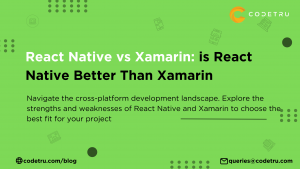Is Native Android App Development With Java Obsolete in 2024?
Over 70% of devices run on Android as of July 2021. We check our smartphones an average of 86 times per day, thanks to the apps we rely on daily—like Instagram, LinkedIn, Uber, WhatsApp, and YouTube. But what drives these apps? Are they native or hybrid? And how do Android apps get developed?

In this blog, we will explore native Android app development, including the role of Java in 2024, and determine if it’s still relevant in the face of evolving technology.
What is Native Android App Development?
Native Android app development refers to creating applications specifically for the Android operating system. These apps are built using tools and languages tailored to Android, such as Android Studio and the Android SDK. Developers use programming languages like Kotlin, Java, and C++ to create these applications.
Native apps are designed to fully utilize the device’s features, including the camera and GPS, and they offer better performance and security compared to hybrid apps. However, native app development can be more expensive and less flexible, which has led to the rising popularity of hybrid apps.
Native vs. Hybrid Apps
Native Android Apps
- Performance: Optimized for Android, providing smooth and efficient user experiences.
- Security: More secure due to data residing on the device.
- Integration: Better integration with Android-specific features.
Hybrid Apps
- Cost-Effective: Generally cheaper to develop as they use a single codebase for multiple platforms.
- Flexibility: Easier to update and maintain.
The Role of Java in Native Android App Development
Java has historically been a key language for Android development. While Kotlin is now Google’s preferred language, Java remains crucial for several reasons:
- Wide Adoption: Java is still widely used in many android apps.
- Community Support: Extensive community resources and support.
- Legacy Code: Many existing apps are built in Java.
However, Java can be complex for beginners, with its intricate features like constructors and exception handling. Despite this, Java’s robust performance and community support make it a valuable language for Android development.
Is Java for Web Development Different from Java for Native Android?
This is one of the common questions, the non-Android app developers usually have. Java syntax and methods in Android Java and Java are the same. However, Android development needs a Software Development Kit (SDK) which has specific classes for app development like click events and UIs, etc.
Is Java still Relevant for Android App Development in 2024?
While Kotlin is increasingly favored by Google for Android development, Java is far from obsolete. Google continues to support Java, and many new apps use a combination of Java and Kotlin. Java remains relevant due to:
- Google Support: Java is supported and integrated with Android OS.
- Community and Legacy: A strong developer community and existing codebases.
Kotlin is recommended for new developers due to its modern features and Google’s Kotlin-first approach. However, learning Java is still beneficial, especially if you have existing knowledge or work with legacy code.
Is Java Still a Viable Option for New Developers?
In 2024, Kotlin will be positioned as the preferred language for new Android development projects due to its modern features and enhanced performance. However, Java continues to be relevant for several reasons:
- Industry Demand: There is still significant demand for Java skills, especially in maintaining and updating existing applications.
- Job Opportunities: While Kotlin is gaining traction, Java skills remain valuable and are sought after in many job postings.
- Integration with Kotlin: Many projects use a blend of Java and Kotlin, making knowledge of both languages beneficial.
Conclusion
Native Android app development is crucial for creating high-performance, secure applications tailored specifically for the Android ecosystem. While Kotlin is the preferred choice moving forward, Java remains a relevant and valuable language in Android development. For beginners, Kotlin offers the latest features and job opportunities, but familiarity with Java is advantageous for working with existing projects and leveraging community support.
FAQs about Native Android App Development
1. What is native Android app development?
Native Android app development involves creating applications specifically for the Android platform using languages like Java or Kotlin. These apps are optimized for Android devices, providing better performance and access to device-specific features like camera and GPS.
2. Is Java obsolete for native Android app development in 2024?
Java is still relevant for native Android app development, although Kotlin is now preferred by Google. Both languages are widely used, with Java offering robust community support and Kotlin enhancing productivity and modern features.
3. What are the advantages of native Android apps over hybrid apps?
Native Android apps offer superior performance and security since they are built using Android-specific languages and APIs. They can fully utilize device features and provide a seamless user experience tailored to Android devices.
4. Why should I choose Kotlin over Java for Android app development?
Kotlin is recommended by Google for Android development due to its modern features, improved productivity, and strong community support. However, Java remains a viable choice with extensive legacy code and support in the Android ecosystem.
5. Which programming languages are used for native Android app development?
The primary languages for native Android app development are Kotlin and Java. Additionally, languages like C++ and C# are used for specific functionalities within Android apps, offering flexibility depending on project requirements.







